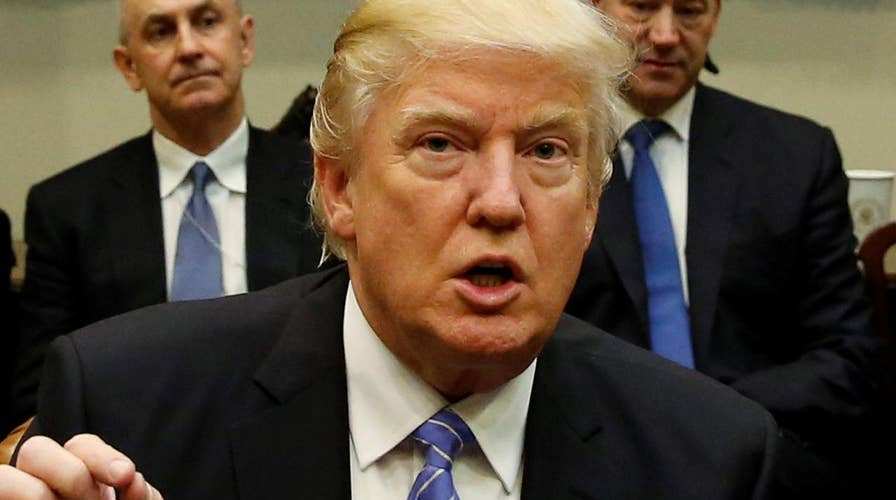Trump lays out agenda in first meeting with business leaders
President says taxes, regulations for companies will be cut 'massively'
I had a George H.W. Bush moment recently. I hope mine turns out better than the former president’s did for him.
Remember the widely reported incident during President Bush’s 1992 re-election bid, when he visited the National Grocers Association convention in Orlando and appeared to be unfamiliar with the checkout scanner exhibited there? A New York Times reporter, who was not even with Bush at the time, turned the event into a caustic account of a rich white guy totally out of touch with everyday America. The truth, it turned out, was that Bush was being shown a prototype of a new checkout scanner that could also weigh groceries and read bar codes that were torn. He marveled at the improvements it featured.
That inaccurate reporting damaged Bush’s already shaky image as a man of the people. Ultimately, of course, he lost to Bill Clinton.
So excuse me while I describe my own “look of amazement” one recent morning as I stood in line at a Dunkin’ Donuts and saw a whir of activity that could be a mini-model for Donald Trump’s promise to revive the economy.
A shoulder-to-shoulder mass of caffeine-starved New Yorkers, not renowned for their forgiving nature, was clamoring to get the attention of six cashiers behind a counter. What struck me was the enthusiasm the employees demonstrated, as well as their efficiency and courtesy. They took the orders calmly and competently, smiling and sometimes exchanging a friendly remark or joke.
As I was making my preference known, there was a loud banging noise behind me from a store nearby. When I started to repeat my order, the cashier smiled brightly and said, “Don’t worry, honey, I heard you just fine.” Sure enough, at the pickup post, my order was delivered — as the cashier promised — perfectly.
“We try to make sure our crew members are friendly, approachable and make eye contact with our guests,” says Scott Murphy, senior VP of operations for Dunkin’ Donuts U.S. “We want that two- or three-minute transaction with a guest to be the best experience of their day before they go to work and get yelled at by their boss. Enthusiasm is the presumption of positive intent. We want problem solvers who can identify a bottleneck and come up with a solution.”
I don’t know if every Dunkin’ Donuts or, for that matter, every coffee store in the country can match the experience I had that morning. Murphy did note that the franchise I visited was one of the highest grossing in the Dunkin’ system. I do know that the attitude and upbeat tempo I saw will guarantee a return visit the next time I need to get re-caffeinated.
Could enthusiasm of the kind I witnessed, in a job that, let’s face it, probably has limited upward mobility, be a secret weapon in the war to strengthen our national economy? If doughnut vendors can find a way to ensure repeat customers, what about those long-neglected workers who found resonance in the words of Donald Trump and made him president?
“Where we have failed our workers is in the failure of talent management to create precisely the kind of enthusiasm you are talking about,” says Peter Kiernan, CEO of Kiernan Ventures and the author of "American Mojo: Lost and Found: Restoring Our Middle Class Before the World Blows By." Kiernan argues that when veterans of World War II returned home, “we were in alignment — government, employers, educational institutions — and said, ‘Let’s give them all the tools they need to create a future that they can look forward to.’ And we did it, through the late 40s, ’50s and into the ’60s. People actually liked their jobs and liked their chances.”
Things broke down, he believes, in the ’70s, when America was hit by what he calls “the three uglies”: double-digit unemployment, inflation and interest rates.
Kiernan thinks our current workforce was betrayed by two important trends: the sudden evolution of technology that displaced our manufacturing base, and the outsourcing of jobs to China and other developing economies — both themes that Trump rode to victory in November.
“What Trump is talking about is what people want,” Kiernan says. “He’s not talking about wealth redistribution. He’s talking about jobs, which is what people understand. He knows people want to get things moving. He’s talking about fixing infrastructure, and that creates jobs. Some of the people who have been left out of the technology revolution have reason to hope, and that leads to enthusiasm.”
“Ours is the first era in history in which enthusiasm is widely suspect, and expression of it even more so,” the British columnist Bernard Levin lamented in his 1983 book titled, appropriately, "Enthusiasms," a full-throated defense of the pleasure that comes from hungrily pursuing the things that we find interesting.
It’s not too late to get it back.

